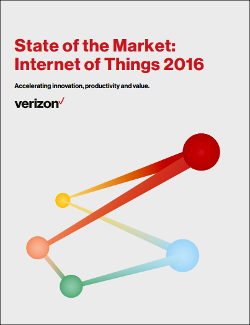Ungated Post | 15 Apr 2016
State of the Market: Internet of Things 2016

2015 was the year that the IoT gained legitimacy; 2016 is the year it goes mainstream. Over the last year, enterprises shook off a "start small, think big" mind-set around IoT, and are now building it into their future strategies and business models.
Oxford Economics surveyed 500 early adopters of IoT across different industry sectors and carried out in-depth interviews with nine IoT pioneers to understand their experiences implementing IoT. The survey investigated progress made implementing IoT, the financial business case, along with actual and expected performance improvements. The survey also explored the constraints that are holding back these early adopters. The survey results and interviews were important research inputs to Verizon’s report. Key findings include:
- Companies across all industries now have IoT squarely on their radar.
- A growing IoT market is enabling organizations from every industry to comply with regulations, increase process efficiency, gain better customer insight, and build completely new business models.
- IoT platforms are making the development of IoT applications easier, faster, and cheaper for everyone.
- Analyzing IoT data remains a difficulty; only 8% use more than 25% of the IoT data they capture. -Security, organizational and cultural change also remain significant constraints.
Oxford Economics’ team is expert at applying advanced economic tools that provide valuable insights into today’s most pressing business, financial, and policy issues.
To find out more about our capabilities, contact:
Americas
Diantha Redd
+1 (646) 503 3052
Email
Asia Pacific
Peter Suomi
+65 6850 0110
Email
EMEA
Aoife Pearson
+44 (0)203 910 8054
Email
Related Services

Post
The economic impact of abandoning the WTO
Oxford Economics have been commissioned by the International Chamber of Commerce (ICC) to provide an independent assessment of the economic impact of WTO dissolution. This report details our findings and the assumptions underpinning our analysis.
Find Out More
Post
The economic impact of the sports activities of public service media
This study shows how the sports activities of public service media supported €4.5 billion of GDP and 57,000 jobs across 31 European countries in 2022. The report also highlights wider economic benefits of public service media sports coverage, such as the way in which it leverages sponsorship income for sports bodies.
Find Out More
Post
Global Trade Education: The role of private philanthropy
Global trade can amplify economic development and poverty alleviation. Capable leaders are required to put in place enabling conditions for trade, but currently these skills are underprovided in developing countries. For philanthropists, investing in trade leadership talent through graduate-level scholarships is an opportunity to make meaningful contributions that can multiply and sustain global economic development.
Find Out More